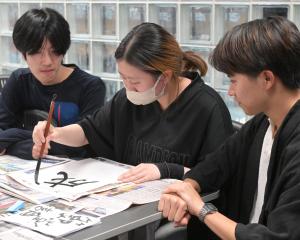
Researchers have again called for the government to consider ending the sale of vaping products in dairies and service stations, capping retailer numbers and preventing vape stores from operating within 500m of schools and marae, after their latest study found vaping is having significant psychological impacts on addicted teenagers.
Study co-leader and University of Otago (Wellington) Aspire Aotearoa Research Centre research fellow Anna Graham-DeMello said adolescents who struggled with vaping addiction felt judged and stigmatised by adults, and blamed themselves for their addiction.
In New Zealand, 10.5% of 15-17 year-olds and 26.5% of 18-24 year-olds vaped daily; and Māori were two and a-half times more likely to vape than non-Māori.
Twenty New Zealanders, aged between 16 and 18, were interviewed for the Health Research Council-funded study, and each described themselves as moderately-to-heavily addicted to vaping.
Ms Graham-DeMello said the teens spoke of feeling stigmatised and unsupported by family members, and some also felt teachers and other adults were antagonistic towards them.
"Though young people understood the criticism could be coming from a caring place, many of our participants resented comments on their vaping.
"Instead of helping them manage their addiction, the criticism diminished their sense of self-worth.
"Some were also quick to point out hypocrisy, noting for instance that they had often seen teachers vaping, only to be reprimanded by the same teachers. These anomalies intensified the confusion and anger they felt."
Those in the study said they were attracted to vaping by its social aspect, particularly because it had become a normal part of their environment.
"Our participants found this positive reinforcement decreased quickly once addiction took hold, however.
"Vaping disrupted their fitness and sleep, and some felt increasingly anxious or unable to concentrate."
Some said they took up vaping to help them manage anxiety and stress, only to find it had the opposite effect.
The adolescents in the study had felt immune to addiction, despite the warnings, and had mistakenly believed they would retain control and be able to vape only when they wanted.
Ms DeMello said few considered how companies manufacturing and promoting vapes were deliberately targeting them with appealing flavours and cheap devices, and even fewer considered whether inadequate regulation had failed them.
"Many of the young people interviewed felt resentful and even disgusted by their addiction.
"They desperately wanted to overcome their addiction, but they felt alone in that struggle."
She said the strong feelings of regret, guilt and self-blame underscored the need for measures to help them stop vaping.
"Targeted cessation programmes could help young people to quit, but these programmes need to be based on empathy.
"Punitive reactions, such as school stand-downs, risk reinforcing the negative feelings participants in these and other studies have reported."
The research findings could help with the development of effective social marketing campaigns to prevent young people taking up vaping, she said.
"Relatable and poignant testimonials of stigma and poor self-esteem could deter young people from taking up vaping in the first place."
The research team said the government should consider limiting the sale of vaping products to stand-alone R18 retailers; capping overall retailer numbers; preventing any vape store from operating within 500m of schools and marae; and preventing retailers from discounting vaping products or using loyalty programmes.
— APL












